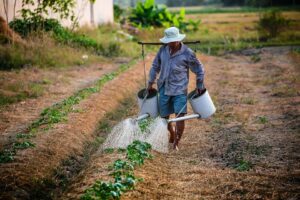Campesino in English translation: farmer, peasant.
‘El campesino in English’ is the person who takes care of the work in the fields, the one who cultivates the land, works both in livestock activities and in agriculture. He is a rural employee, although he can also be called a peasant who lives in the countryside and not in the city. The peasant is in charge of the production of raw materials that are used for human consumption.

Being a peasant has benefits, for example, he can obtain his materials and food to live. As it is also usually working for commercial purposes and profit.
In some Latin American countries, it is called ‘campesino‘ to a person who does not have much education or has little knowledge on a particular subject. In this case, the word is used in a derogatory way.
How to say campesino in English?
Vocabulary
farmer, peasant, countryman (masculine) – campesino
farmer, peasant, countrywoman (feminine) – campesina
countryside, rural area – campo
Sentences with the word campesino in Spanish
| El campesino no reconoció al forastero. | – | The peasant did not recognize the stranger. |
| Aprende con placer el campesino el arte de sembrar. | – | The peasant learns with pleasure the art of sowing. |
| El hombre no era el campesino que todos esperaban. | – | The man was not the peasant that everyone expected. |
| Fue probado en el campo el campesino. | – | The peasant was tested in the field. |
| En el pueblo, el campesino tiene sus cantares propios. | – | In the town, the peasant has his own songs. |
| El campesino no quiso sembrar maíz este invierno. | – | The farmer did not want to plant corn this winter. |
| Era un hombre serio el campesino. | – | He was a serious peasant man. |
| Los extranjeros se burlaron y el campesino lloró. | – | The foreigners mocked and the peasant wept. |
| El campesino era muy honrado en cuanto a pesar lo justo en mercancía. | – | The peasant was very honest when it came to weighing the fair amount of merchandise. |
| Vea lo que le pasó Juan con el campesino nuevo. | – | See what happened to Juan with the new peasant. |
| Valiente es el campesino que siembra y ama la tierra. | – | Brave is the peasant who sows and loves the land. |
| Su tío creció y se educó como el campesino trabajador qué es. | – | His uncle grew up and was educated as the hardworking peasant that he is. |
| El campesino sacó tres peniques y pagó su trago. | – | The peasant took out threepence and paid for his drink. |
| Tuvo que cargar al animal el campesino fortachón. | – | He had to carry the animal the strong peasant. |
| El campesino tenía el hábito de estar siempre junto a su esposa. | – | The peasant had the habit of always being with his wife. |
| Maldijo el campesino al señor y lo llamó mil veces ladrón. | – | He cursed the peasant to the lord and called him a thousand times a thief. |
| Estaba impaciente por ponerla a prueba con el campesino. | – | He was impatient to test her on the peasant. |
| El campesino rubio pudo haber robado la cosecha. | – | The blond peasant could have stolen the harvest. |
| Apenas podía hablar después del susto el campesino. | – | He could hardly speak after frightening the peasant. |
| A su lado estaba el campesino que había llegado nuevo al pueblo. | – | Next to him was the peasant who had arrived new in town. |
| El campesino los observaba a través de los párpados cansados. | – | The peasant watched them through tired eyelids. |
| Tenía un buey fuerte y robusto el campesino. | – | He had a strong and robust ox the peasant. |
| Más vale que el campesino encuentre la bestia en el monte. | – | The peasant had better find the beast in the bush. |
| El campesino quitó toda la paja del camino. | – | The farmer removed all the straw from the road. |
| Entregaron toda la cosecha en barriles y el campesino estuvo alegre. | – | They delivered the entire harvest in barrels and the farmer was happy. |
| El campesino hace represas para recoger el agua de las lluvias. | – | The farmer builds dams to collect rainwater. |
| Ahora soy el buen campesino, que conoce la superficie de la tierra. | – | Now I am the good peasant, who knows the surface of the earth. |
| Soy el campesino qué está a cargo de estas tierras. | – | I am the peasant who is in charge of these lands. |
| El campesino tiene las manos callosas. | – | The peasant has calloused hands. |
| Tomó un sorbo de café el delgado campesino. | – | He took a sip of coffee the thin peasant. |